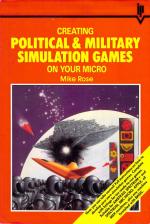
Computer Gamer
 1st October 1985
1st October 1985
Categories: Review: Book
Author: Jane Naylor
Publisher: Interface
Machine: Commodore 64/128/Spectrum 48K
Published in Computer Gamer #7
Creating Political And Military Simulation Games On Your Micro
This book is from the same publishers as the Commodore arcade games book and is conceived along the same lines. It is in two parts, with all the theory and explanations first, followed by listings that you can let loose on to prove that the theory really works.
It is aimed at owners of all the popular micros without being particularly machine specific so most people interested in this subject should find something for them here. The particular machines mentioned are: Amstrad, Spectrum, Commodore 64, BBC Micro, Apple and the MSX machines but once you have got the principles you could apply them to any machine.
It's a slightly different subject, political and military simulation games, and although they may sound a bit daunting I should think to many people they might be a welcome change from shooting down alien invaders once again. It's certainly nice for a bookshelf browser to come across something that's a bit out of the ordinary.
So, the first half of the book is about inventing and developing the game. The author shows that both types of game have a lot in common, such as random factors (deserters or strikes) and subgames (military retreat or local elections). With flow diagrams and tables, he shows you how to plan the development of your idea and then how to translate it into actual coding that will "do something".
The second half of the book contains a selection of ten programs, each "ready to run". I have my suspicions about the ready-to-run bit, as there are such great differences between, for example, Commodore and BBC Basics. A note at the front of the book points out that the listings may need some "adapting" for your own computer, and I can't help feeling that this might be a bit of an understatement for the relative novice that the book is supposed to be aimed at. However, it will certainly give you the opportunity to practise your programming skills!
This book too, I feel, is the poorer for having no screenshots or illustrations of the effects described.
There is a good selection of games provided, ranging across history from "the Siege of Doune Castle" to "Galactic Empire" and across the world from Downing Street to Iceland. There are instructions provided with each and some handy tactical tips from time to time.
There is a lot in this book and although £7.95 is a bit on the pricey side. I don't think you could grouse too much. For strategy game freaks I'm sure it will be a winner.
Scores
Commodore 64/128/Spectrum 48K Version| Overall | 82% |


